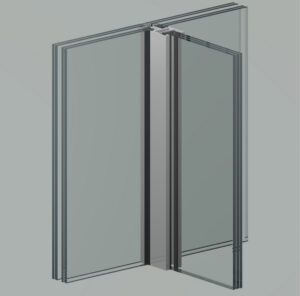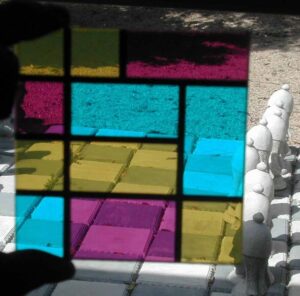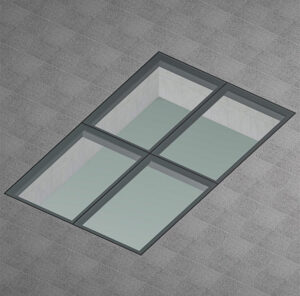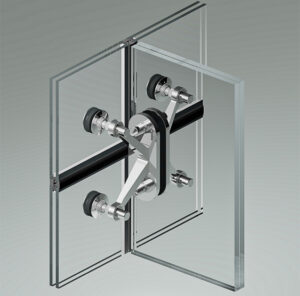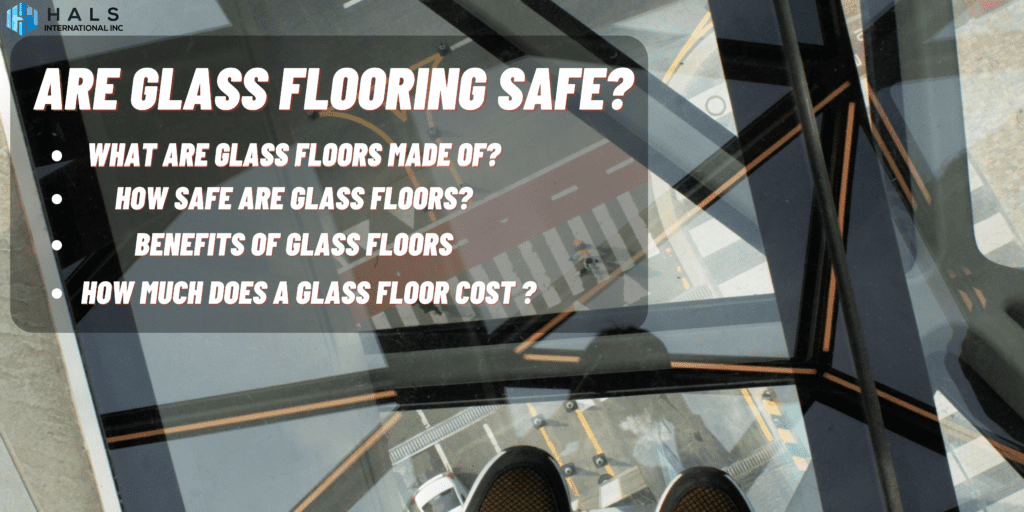
Are Glass Floors Safe?
Glass floors can be safe when designed and installed correctly. To ensure safety, materials must be of high quality, installations must be accurate, and regulations must be followed. It is fundamentally important to use tempered glass that breaks into smaller, less sharp pieces when it breaks. In order to ensure the glass floor is capable of bearing the intended load, whether for pedestrians or heavy loads, proper anchoring and structural support are Important. HalsInternational are here to provide you the Premium Glass Floors service fulfill the safety purpose.
What Are Glass Floors Made Of?
Glass floors are typically made of tempered glass, laminated glass, or a combination of both. Tempered glass is stronger than regular glass and is designed to break into small, dull pieces if it shatters, reducing the risk of injury. Laminated glass, on the other hand, consists of two or more layers of glass that are bonded together with a layer of plastic in between. If the glass breaks, the plastic layer helps to hold the glass together, preventing it from shattering and reducing the risk of injury.
You can check out our high quality products to utilize them in your projects:
Contact Us for Unique Products And Services
How Safe Are Glass Floors?
Glass floors are generally safe if they are installed and maintained correctly. When installed properly, tempered or laminated glass can support the weight of several people and is less likely to break. However, it’s important to note that all glass has its limits, and overloading the glass floor could cause it to crack or shatter.
In addition to the type of glass used, the safety of a glass floor depends on how it’s installed. It’s crucial to ensure that the glass is installed on a stable and level surface and that it’s supported by a structurally sound frame. It’s also essential to follow the manufacturer’s guidelines for the maximum weight limit that the glass floor can support.
Another factor to consider is the maintenance of the glass floor. Over time, the glass can become scratched or chipped, which can weaken the glass and make it more prone to cracking or shattering. Regular inspections and maintenance can help identify and address any potential issues before they become a safety hazard.
Benefits Of Glass Floors
- Aesthetic Appeal: Glass floors add a touch of modern elegance to any space, creating a visually striking and unique design feature.
- Natural Light: They allow natural light to pass through, brightening lower levels of buildings and enhancing the overall ambiance.
- Space Optimization: Glass floors can visually expand a room or space, making it appear larger and more open.
- Design Flexibility: They can be customized with various textures, patterns, and colors to match any interior or architectural style.
- Durability: High-quality tempered glass is durable and resistant to wear, ensuring long-lasting performance.
- Safety: When installed correctly and with the right precautions, glass floors can be safe for pedestrian use and even heavy loads.
- Wow Factor: Glass floors often create a “wow” factor, impressing visitors and enhancing the overall value of a property.
- Connectivity: They can connect different levels of a building, providing a visually stunning transition between spaces.
- Easy Maintenance: Glass floors are relatively easy to clean and maintain, making them a practical choice for various applications.
Quality Of Glass Floors
Glass floors can be safe when designed, installed, and maintained correctly. The safety of a glass floor primarily depends on several factors:
- Quality of Materials: High-quality, tempered glass is nesscessry for safety. Tempered glass is designed to shatter into small, less sharp pieces when it breaks, reducing the risk of injury. The glass should also have a sufficient thickness to support the expected load.
- Installation: Proper installation is important. Glass floors should be securely anchored, and the structural supports underneath should be capable of bearing the weight of people or objects on the surface. This includes ensuring that the glass is correctly fitted into its frame or support structure.
- Anti-Slip Coatings: To prevent slipping, glass floors can be treated with anti-slip coatings or textures. This is especially important in areas where the floor might become wet, such as bathrooms or outdoor installations.
- Load-Bearing Capacity: Glass floors should be designed with the anticipated load in mind. If they are intended for pedestrian use, they will have different load-bearing requirements than those designed for heavy objects or vehicles.
- Regular Maintenance: Ongoing maintenance is important to ensure safety. Regular inspections should be performed to check for any signs of damage, wear, or stress. Any issues should be addressed promptly to prevent accidents.
- Proper Use: Users should be educated on the proper use of walkable glass floors. For example, avoiding the use of high-heeled shoes or heavy objects that could cause localized stress on the glass.
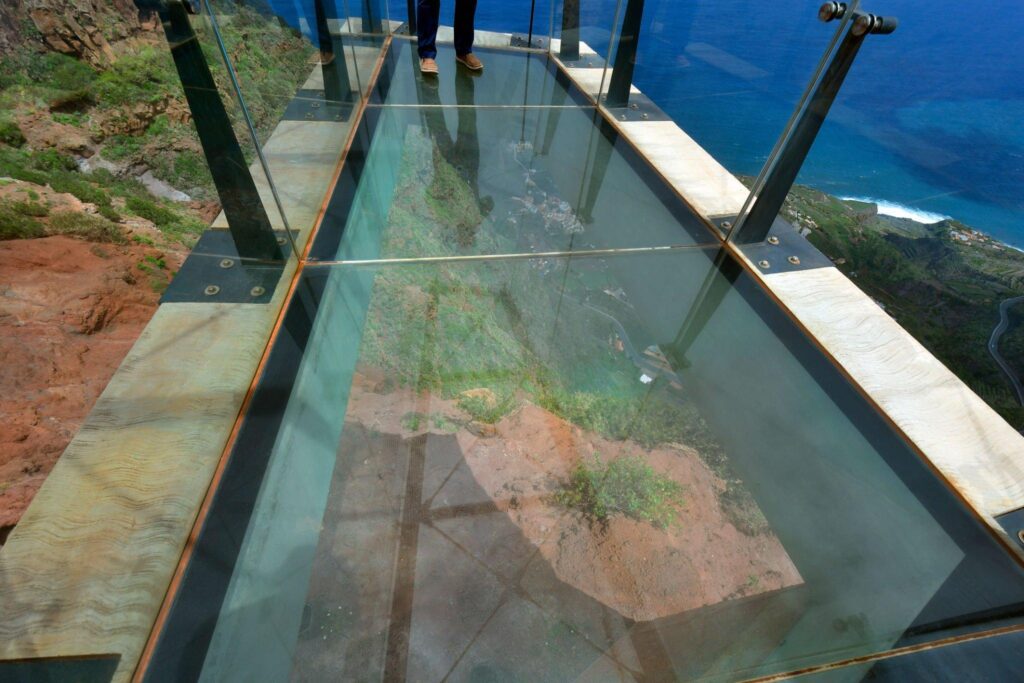
How Much Does A Glass Floor Cost ?
Glass floors are becoming increasingly popular in modern architecture, adding a unique touch of elegance and sophistication to any space. However, many people may be wondering about the cost of installing a glass floor. In this article, we will explore the factors that affect the cost of a glass floor and provide an estimate of how much it may cost.
Factors Affecting The Cost Of A Glass Floor
Several factors can influence the cost of a glass floor. Here are the most important factors:
Type of Glass:
The type of glass used for the floor will affect the cost. Tempered glass is the most common type of glass used for flooring because of its durability and strength. However, laminated glass is also a good option because of its added safety features, such as shatterproof interlayers. The thickness of the glass can also impact the cost.
Size of the Floor:
The size of the glass floor will also affect the cost. A larger floor will require more glass, which means more materials and labor. The shape of the floor, whether it is rectangular or irregular, can also affect the cost.
Design and Style:
The design and style of the glass floor can significantly impact the cost. Customized designs will cost more than a standard design, as they require more labor and specialized materials.
Installation:
Installation is a significant factor in the cost of a glass floor. A professional installation requires specialized skills and equipment, which will add to the overall cost.
Estimating The Cost Of A Glass Floor
The cost of a glass floor can vary widely, depending on the factors mentioned above. However, we can provide a rough estimate of how much a glass floor may cost.
A small, simple glass floor may cost around $50 to $80 per square foot. However, larger and more complex designs may cost up to $200 per square foot or more.
Conclusion
Glass floors can be a safe and stylish addition to any home or commercial building when installed and maintained correctly. The type of glass used, the installation process, and maintenance all play a important role in the safety of the glass floor. A professional and experienced contractor with experience installing glass floors is necessary when you’re considering installing one. To reduce the risk of injury, they can ensure that a glass floor is properly installed and maintained. Any space can benefit from the elegance and uniqueness of a glass floor, but it does come at a price. T
To get the best Glass Floor installation service Contact Us. By considering the factors mentioned above, we can provide a rough estimate of how much a glass floor may cost. Wor with the professional team of HalsInternational.

